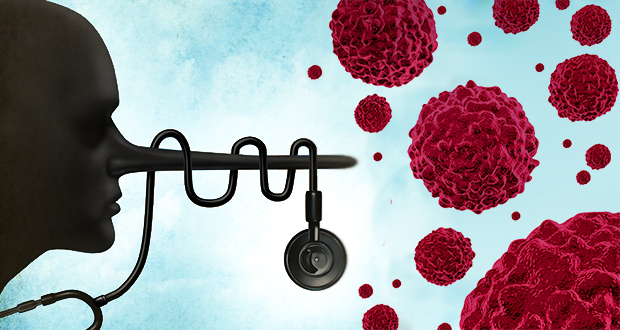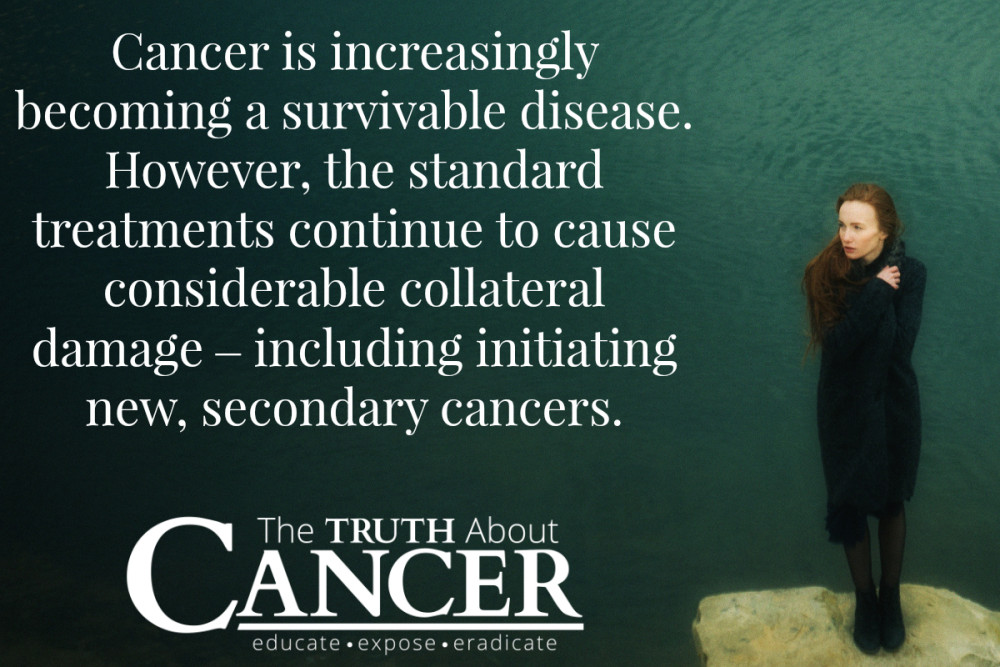By Elyn Jacobs

Cancer is big business, no doubt about it. But did you know that the treatment your doctor orders could actually increase the likelihood that you will become a repeat customer? Conventional cancer treatments such as chemotherapy and radiation actually promote cancer. Yes, you read that correctly… they promote cancer!
Cancer is increasingly becoming a survivable disease, yet the treatments cause considerable collateral damage – including initiating new, second cancers.
Second cancers are cancers unrelated to the original cancer, which can be triggered by the very same imbalances or cancer-causing agents that led to the first cancer. In fact, doctors sometimes refer to the risk of a second cancer as “friendly fire” – that is treatment for one cancer resulting in the initiation of a second cancer. How in God’s name could any doctor fail to mention to a patient the possibility that second cancers can be created by the very cancer treatment they are administering?
How Long Has it Been Known That Chemotherapy and Radiation Can Lead to Second Cancers?
The link between chemotherapy and radiation and the development of second cancers has been known for decades! Even the American Cancer Society acknowledges that radiotherapy and chemotherapy are
carcinogens and may increase risk for developing a second cancer, and that the risk is even higher when both therapies are given together. Yet still this information is not typically shared with patients or is severely downplayed by oncologists.
Chemotherapy and Second Cancers
Chemotherapy targets the DNA of cancer cells, specifically rapidly dividing cells. However, in the process it also impacts healthy cells. Risk is dose and treatment-duration related.
The most common cancers linked to chemotherapy drugs are AML (acute lymphocytic leukemia) and MDS (myelodysplastic syndrome). The news of ABC’s Good Morning America host Robin Robert’s diagnosis of MDS is a perfect example.

Radiation and Second Cancers
Beyond the obvious link from radiation exposure to cancer (Chernobyl, Fukushima, and atomic bomb blasts in Japan) and all the credible new information linking cell phones and EMFs to cancer, radiation therapy has been recognized as carcinogenic for many years. Like chemotherapy drugs, radiation therapy destroys cancer cells but also harms healthy cells.
Radiation therapy has been linked to the occurrence of solid tumors of the lung, stomach, and bone, and to various types of leukemia such as AML (acute myelogenous leukemia), CML (chronic myelogenous leukemia), and ALL (acute lymphoblastic leukemia).
The Links Between Chemotherapy and Radiation to Second Cancers are Known and Vast
- Chemotherapy drugs that are alkylating agents such as mechlorethamine, cyclophosphamide, chlorambucil, melahalan, and others interfere with a cell’s DNA that can sometimes cause AML and MDS.
- Non-alkylating chemotherapy agents (platinum-based drugs) such as cisplatin and carboplatin attack cancer cells in a similar way, increasing the risk for leukemia. Risk is dose related and the risk of developing leukemia increases even more if radiation is given along with cisplatin or carboplatin (or other platins).
- In the case of topoisomerase II inhibitors such as Etoposide, Teniposide, and Mitoantrone, the drugs stop cells from being able to repair DNA, sometimes causing leukemia, often within as little as 2-3 years. Anthracyclines, while still topoisomerase II inhibitors, are less likely to cause leukemia.
- Targeted therapy drugs such as Zelboraf and Tafinlar, which are used to treat melanoma, increase the risk of squamous cell carcinomas of the skin.
- Patients given immunosuppressive medication (they suppress the immune system), such as cyclophosphamide, chlorambucil and nitrogen mustard (for treatment or during organ transplants) are proven to develop second cancers.
- Radiation treatment for breast cancer significantly increases risk for developing lung cancer.
- Radiation treatment to the prostate can result in carcinomas.
- Chemo used to treat lymphomas and breast cancer can initiate bladder cancer.
- Chemo has been linked to the initiation of testicular cancer.
- Prior cancer treatments are a key risk factor for subsequent neoplasms for childhood cancer survivors.
- Stem cell transplants increase risk of second cancers from the chemotherapy and radiation used as well as the associated suppression of the immune system.
While secondary malignancies may be due to many factors, chemotherapy and radiation are both carcinogens; exposure to these therapies can result in an increased risk of second cancers.
Sadly, many oncologists do not inform their patients that the treatments they prescribe could possibly lead to a second cancer. Now you know and The Truth About Cancer is here to educate and empower you with this knowledge and information.
Please help bring more awareness about the dangers of second cancers from chemotherapy and radiation by sharing this article with your friends and family.
No hay comentarios:
Publicar un comentario